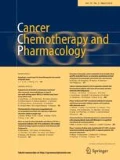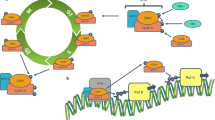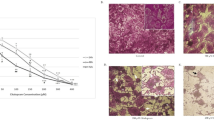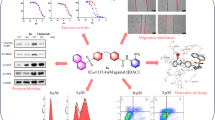Abstract.
Trichostatin A (TSA) and trapoxin (TPX), inhibitors of the eukaryotic cell cycle and inducers of morphological reversion of transformed cells, inhibit histone deacetylase (HDAC) at nanomolar concentrations. Recently, FK228 (also known as FR901228 and depsipeptide) and MS-275, antitumor agents structurally unrelated to TSA, have been shown to be potent HDAC inhibitors. These inhibitors activate the expression of p21Waf1 in a p53-independent manner. Changes in the expression of regulators of the cell cycle, differentiation, and apoptosis with increased histone acetylation may be responsible for the cell cycle arrest and antitumor activity of HDAC inhibitors. TSA has been suggested to block the catalytic reaction by chelating a zinc ion in the active site pocket through its hydroxamic acid group. On the other hand, an epoxyketone has been suggested to be the functional group of TPX capable of alkylating the enzyme. We synthesized a novel TPX analogue containing a hydroxamic acid instead of the epoxyketone. The hybrid compound, called cyclic hydroxamic-acid-containing peptide 1 (CHAP1) inhibited HDAC at low nanomolar concentrations. The HDAC1 inhibition by CHAP1 was reversible, as is that by TSA, in contrast to irreversible inhibition by TPX. Interestingly, HDAC6, but not HDAC1 or HDAC4, was resistant to TPX and CHAP1, while TSA inhibited these HDACs to a similar degree. CHAP31, the strongest HDAC inhibitor obtained from a variety of CHAP derivatives, exhibited antitumor activity in BDF1 mice bearing B16/BL6 tumor cells. These results suggest that CHAP31 is promising as a novel therapeutic agent for cancer treatment, and that CHAP may serve as a basis for new HDAC inhibitors and be useful for combinatorial synthesis and high-throughput screening.
Similar content being viewed by others
Author information
Authors and Affiliations
Additional information
Electronic Publication
Rights and permissions
About this article
Cite this article
Yoshida, M., Furumai, R., Nishiyama, M. et al. Histone deacetylase as a new target for cancer chemotherapy. Cancer Chemother Pharmacol 48 (Suppl 1), S20–S26 (2001). https://doi.org/10.1007/s002800100300
Issue Date:
DOI: https://doi.org/10.1007/s002800100300




